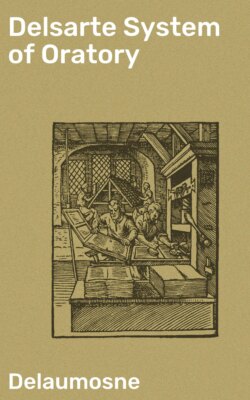Читать книгу Delsarte System of Oratory - Delaumosne - Страница 19
На сайте Литреса книга снята с продажи.
Of Respiration and Silence.
ОглавлениеWe place respiration and silence under the same head because of their affinity, for respiration may often be accounted silence.
Of silence.--Silence is the father of speech, and must justify it. Every word which does not proceed from silence and find its vindication in silence, is a spurious word without claim or title to our regard. Origin is the stamp, in virtue of which we recognize the intrinsic value of things. Let us, then, seek in silence the sufficient reason of speech, and remember that the more enlightened the mind is, the more concise is the speech that proceeds from it. Let us assume, then, that this conciseness keeps pace with the elevation of the mind, and that when the mind arrives at the perception of the true light, finding no words that can portray the glories open to its view, it keeps silent and admires. It is through silence that the mind rises to perfection, for silence is the speech of God.
Apart from this consideration, silence recommends itself as a powerful agent in oratorical effects. By silence the orator arouses the attention of his audience, and often deeply moves their hearts. When Peter Chrysologue, in his famous homily upon the gospel miracle of the healing of the issue of blood, overcome by emotion, paused suddenly and remained silent, all present immediately burst into sobs.
Furthermore, silence gives the orator time and liberty to judge of his position. An orator should never speak without having thought, reflected and arranged his ideas. Before speaking he should decide upon his stand-point, and see clearly what he proposes to do. Even a fable may be related from many points of view; from that of expression as well as gesture, from that of inflection as well as articulate speech. All must be brought back to a scene in real life, to one stand-point, and the orator must create for himself, in some sort, the rôle of spectator.
Silence gives gesture time to concentrate, and do good execution.
One single rule applies to silence: Wherever there is ellipsis, there is silence. Hence the interjection and conjunction, which are essentially elliptic, must always be followed by a silence.
Respiration.--For the act of respiration, three movements are necessary: inspiration, suspension and expiration.
Its importance.--Respiration is a faithful rendering of emotion. For example: He who reigns in the skies. Here is a proposition which the composed orator will state in a breath. But should he wish to prove his emotion, he inspires after every word. He--who--reigns--in--the--skies. Multiplied inspirations can be tolerated on the strength of emotion, but they should be made as effective as possible.
Inspiration is allowable:--
1 After all words preceded or followed by an ellipse;
2 After words used in apostrophe, as Monsieur, Madame;
3 After conjunctions and interjections when there is silence;
4 After all transpositions; for example: To live, one must work. Here the preposition to takes the value of its natural antecedent, work; that is to say, six degrees, since by inversion it precedes it, and the gesture of the sentence bears wholly on the preposition;
5 Before and after incidental phrases;
6 Wherever we wish to indicate an emotion.
To facilitate respiration, stand on tip-toe and expand the chest.
Inspiration is a sign of grief; expiration is a sign of tenderness. Sorrow is inspiratory; happiness, expiratory.
The inspiratory act expresses sorrow, dissimulation.
The expiratory act expresses love, expansion, sympathy.
The suspensory act expresses reticence and disquietude. A child who has just been corrected deservedly, and who recognizes his fault, expires. Another corrected unjustly, and who feels more grief than love, inspires.
Inspiration is usually regulated by the signs of punctuation, which have been invented solely to give more exactness to the variety of sounds.
